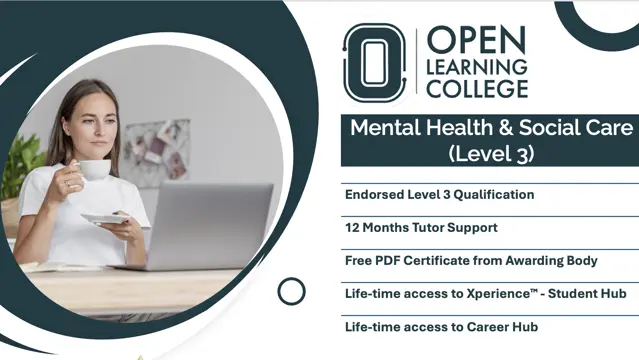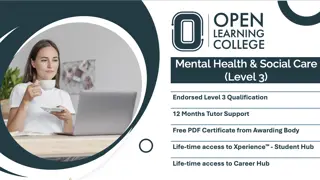
Mental Health & Social Care (Level 3) Diploma
Distance Learning Course, featuring tutor support and AI assistance, available online or as a study pack option.
Open Learning College
Summary
Funding options available on our website
- QLS & OPA - Free
- Exam(s) / assessment(s) is included in price
- Tutor is available to students
- TOTUM card included in price What's this?
Add to basket or enquire
Overview
Embark on a transformative learning journey with the UK’s most innovative home study provider, offering courses designed to unlock your true potential and facilitate the career change you desire. Access our distance learning courses directly from anywhere, anytime, and acquire industry-recognised Professional Qualifications essential for advancing in your career.
Specifically, explore the flexible and convenient Mental Health + Social Care (Level 3) course, an ideal way to gain a diploma qualification. Whether you aim for further education, improved job prospects, or expanded knowledge, this comprehensive course allows you to prepare thoroughly for exams or careers through home study. Plus, it’s structured to be accessible and beneficial even if you have no prior knowledge in Mental Health + Social Care.
The aim of this course is to provide students with the opportunity to study Mental Health and social care at level 3 and its associated principles and practices.
The course is intended for those interested in mental health and social care issues, those who are already involved with mental health and social care practice or for those who wish to further their knowledge and understanding in order to progress to higher levels of study or transfer their knowledge to practical based roles (according to organisational or specific criteria and requirements).
Students will study the historical perspectives for both social care and mental health and this will include exploring how social care has changed over the last century, the development of mental health care services, and how mental health conditions are classified.
There will also be study of a wide range of factors which influence service provision and legislation that defines and shapes practice, including diagnosis and treatment, social inclusion, discrimination and care standards.
Achievement
Course media
Resources
- Mental Health + Social Care Level 3 (QLS) Course -
Description
the Mental Health + Social Care (Level 3) course is divided into 10 modules.
Module 1: The history of mental health and social care
Defining social care, the aging society, social class, advent of the NHS and what this meant in terms of care and service provision, health promotion and expectations of service users.
Module 2: Research and Statistics
Mental health and social care incorporates evidence based practice, policy related to statistical data and predictions. Therefore this unit provides students with a basic overview of research design and statistical analysis which will help develop understanding of how data are used in shaping policy and service provision.
In this unit we explore the following:
- Types of research methods and methodology.
- Data analysis.
- How statistics are used.
- The relevance of statistics to mental health and social care.
Module 3: Diagnosis and Treatment of Mental Health Conditions
This unit looks at how the classification systems were developed (DSM-IV and ICD) and how they are used to classify mental health disorders.
The unit also discusses the assessment of mental health conditions in a range of contexts including primary and secondary care.
This unit will also explore the diagnosing and assessing from a number of perspectives within these settings including health care professionals and mental health workers.
Module 4: Mental Health Conditions
This unit focuses on a number of key examples of mental health conditions and will present the underpinning anatomy and physiology, physical and psychological therapies and alternative therapies.
Example conditions:
- Schizophrenia.
- Depression.
- Personality disorders.
- Disabilities (learning, skills etc.).
- Minor mental health disorders .
Module 5: Social Inclusion
One of the major predisposing to mental illness is social exclusion. In this unit we explore the barriers to social inclusion at a community and society level.
The unit also examines stigma and marginal groups in society and how these factors relate to social inclusion.
The unit includes discussion related to key research and person or user centred approaches to promote knowledge and awareness related to social inclusion.
In addition the unit explores:
- Volunteer programmes.
- Partnership programmes.
- Training programmes and work placements.
- National service frameworks.
- Skills and service development for inclusion .
Module 6: Our Ageing Society
In this unit we discuss the physiology of ageing and examine some statistical evidence for increased life expectancy and what this means for society as a whole.
The unit will include discussion about service provision for the older persons with mental health problems and this incorporates legislation and policy to prevent discrimination and promote parity relating to access to services.
Key conditions will be explored and those include:
- Dementia.
- Depression in the elderly person.
- Bereavement, loss and loneliness.
Included in the unit will be some discussion about residential care, capacity and consent and coverage of the NSF standards for mental health care in older adults.
Module 7: Care Services and Support
This unit examines current legislation in the UK related to service provision and care support for those with mental health care problems. This includes:
- Legislation and policy.
- Eligibility criteria.
- Meeting mental health care needs.
- NSF standards.
- Service user involvement.
- Care choices.
Module 8: The Community Mental Health Care Team (CMHT)
In this unit you examine the structure and aims of the CMHT and also outlines the roles and responsibilities of key members this includes:
- Community Mental Health Care Teams (CMHT).
- Outreach teams.
- Crisis resolution teams.
- Early intervention team.
- In patient care.
Module 9: Assessment of Risk
This unit defines and discusses risk related to mental health conditions. This includes:
- What is risk and how can it be assessed?
- Risk and aggression within acute in patient wards.
- Managing risk in secondary and primary care.
- Community services and models.
- Monitoring risk in community settings.
- Voluntary admission and sectioning under the Mental Health Act.
Module 10: The Future of Mental Health and Social Care
Mental health and social care provision and needs change quickly and therefore this is a dynamic state. In order to continue to provide effective and appropriate care the systems, agencies and society as a whole need to change at a commensurate rate.
In this unit we explore current issues in mental health and social care including policy, funding, service provision and service user access.
The unit concludes by discussing future care needs and how these will be accommodated politically, socially and economically.
In addition we will discuss the role of society in mental health and social care provision and look at this from the perspective of an individual, family, community and nation.
What Will You Learn?
- In the Mental Health + Social Care course, you'll delve into a comprehensive curriculum covering various facets of mental health and social care.
- You'll explore topics like mental health disorders, their causes, symptoms, and intervention strategies.
- The course encompasses understanding different therapy techniques, assessing mental health needs, and learning about legislation and policies guiding social care practices.
- You'll acquire communication skills crucial for effective support, grasp ethical considerations, and explore the complexities of safeguarding vulnerable individuals.
- Additionally, you'll delve into community-based approaches, resource management, and holistic care methodologies, preparing you for a range of roles within mental health and social care sectors.
Who is this course for?
- The Mental Health + Social course caters to individuals passionate about fostering positive change in mental health and social support domains.
- It's designed for aspiring mental health professionals, social care workers, counselors, or individuals eager to contribute to improving the well-being of others.
- This course is ideal for those seeking a comprehensive understanding of mental health challenges, intervention strategies, and social care frameworks.
- It's particularly suitable for students aspiring to enter mental health support roles, professionals looking to enhance their expertise in mental health care, and anyone interested in making a substantial difference in the lives of individuals facing mental health issues within their communities.
Requirements
- The good news is that no prior learning knowledge or experience is essential to take this course. This course is openly available to anyone wishing to learn more about Mental Health + Social Care (Level 3) and would like to take part in a highly rewarding distance learning study course.
- We believe that everyone should have the opportunity to expand their knowledge and study further, so we try to keep our entry requirements to a minimum.
- You have the freedom to start the course at any time and continue your studies at your own pace for a period of up to 12 months from initial registration with full tutor support.
Career path
As a mental health nurse, you’ll help people with mental health conditions by supporting their recovery or helping them to live independently while improving their quality of life
Questions and answers
Certificates
QLS & OPA
Digital certificate - Included
Open Learning College have undergone external quality checks to ensure that the organisation and the courses’ it offers meet a high standard. Regular reviews of our courses are carried out as part of the endorsement process.
The course depth and study has been benchmarked at Level 3 against level descriptors published by Ofqual.
Visit www.qualitylicencescheme.co.uk for more information.
1. You will receive your accreditation directly from QLS, once you have successfully completed your course (certification fees are included in the course fee).
2. You will receive the Open Pathway Accreditation Diploma (OPA.dip) from Open Learning College.
Reviews
Currently there are no reviews for this course. Be the first to leave a review.
Legal information
This course is advertised on reed.co.uk by the Course Provider, whose terms and conditions apply. Purchases are made directly from the Course Provider, and as such, content and materials are supplied by the Course Provider directly. Reed is acting as agent and not reseller in relation to this course. Reed's only responsibility is to facilitate your payment for the course. It is your responsibility to review and agree to the Course Provider's terms and conditions and satisfy yourself as to the suitability of the course you intend to purchase. Reed will not have any responsibility for the content of the course and/or associated materials.



